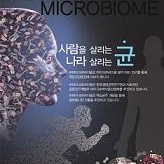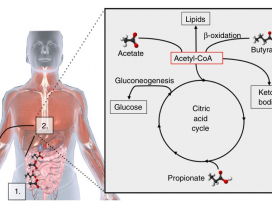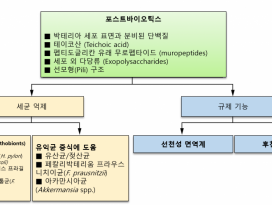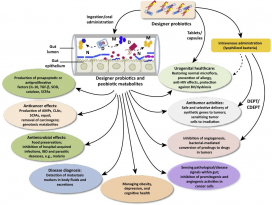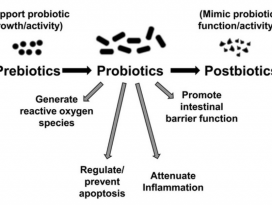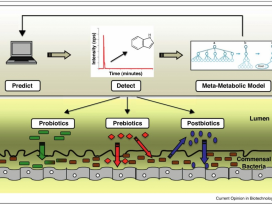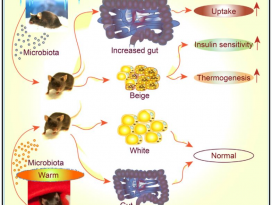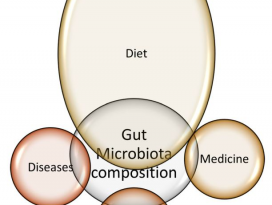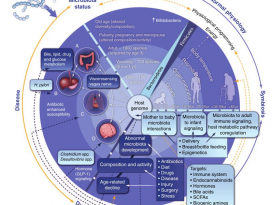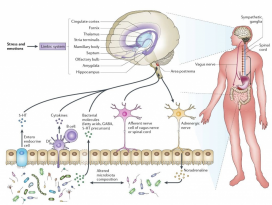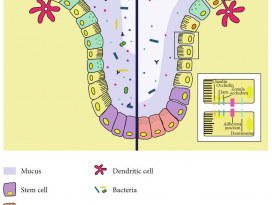[Gut Microbiome] Gut microbe-derived extracellular vesicles induce insulin resistance, thereby impairing glucose metabolism in skeletal muscle
- e 1519
Gutmicrobe-derived extracellular vesicles induce insulin resistance, therebyimpairing glucose metabolism in skeletal muscle
Youngwoo Choi,Yonghoon Kwon, Dae-Kyum Kim, Jinseong Jeon, Su Chul Jang,Taejun Wang, Minjee Ban, Min-Hye Kim, Seong Gyu Jeon,Min-Sun Kim, Cheol Soo Choi, Young-Koo Jee, Yong Song Gho,Sung Ho Ryu & Yoon-Keun Kim
| Gut microbes might influence host metabolic homeostasis and contribute to the pathogenesis of type 2 diabetes (T2D), which is characterized by insulin resistance. Bacteria-derived extracellular vesicles (EVs) have been suggested to be important in the pathogenesis of diseases once believed to be noninfectious. Here, we hypothesize that gut microbe-derived EVs are important in the pathogenesis of T2D. In vivo administration of stool EVs from high fat diet (HFD)-fed mice induced insulin resistance and glucose intolerance compared to regular diet (RD)-fed mice. Metagenomic profiling of stool EVs by 16S ribosomal DNA sequencing revealed an increased amount of EVs derived from Pseudomonas panacis (phylum Proteobacteria) in HFD mice compared to RD mice. Interestingly, P. panacis EVs blocked the insulin signaling pathway in both skeletal muscle and adipose tissue. Moreover, isolated P. panacis EVs induced typical diabetic phenotypes, such as glucose intolerance after glucose administration or systemic insulin injection. Thus, gut microbe-derived EVs might be key players in the development of insulin resistance and impairment of glucose metabolism promoted by HFD. |
제목
장내 미생물 유래 세포외 소포 (extracellular vesicles)는인슐린 저항성을 유도하여, 골격근의 포도당 대사를 손상시킨다.
내용
장내 미생물은 숙주의 대사 항상성 (metabolic homeostasis)에영향을 미칠 수 있고, 인슐린 저항성을 특징으로 갖는 제 2형당뇨병의 병인에 기여할 수 있다. 미생물에서 유래된 세포외 소포(EVs)는 한때 비감염성인 것으로 여겨졌던 질병들의 발병 기전에 있어서 중요하다고 제안되어왔다. 본연구에서 우리는 장내 미생물 유래 EVs가 제 2형 당뇨병의발병 기전에서 중요하다는 가설을 세웠다. 일반적인 식단 (RD; regulardiet)을 한 생쥐보다, 고지방식 식단 (HFD; highfat diet)을 먹은 쥐의 대변 EVs를 생체 내에 투여하자 인슐린 저항성과 포도당불내증 (glucose intolerance)이 유도되었다. 16SrDNA 염기서열 분석에 의한 대변 EVs의 메타유전학 프로파일링은 RD 쥐에 비해 HFD 쥐에서 슈도모나스 파나시스 (Pseudomonas panacis; P.panacis) (프로테오박테리아(Proteobacteria) 문에 속함)에서 유래된 EVs의 양이 증가함을 보였다. 흥미롭게도, P. panacis EVs는 골격근및 지방 조직에서 인슐린 신호 전달 경로를 차단했다. 더욱이, 분리된P. panacis EVs는 포도당 투여 또는 전신 인슐린 주사 이후 포도당 불내증과 같은 전형적인 당뇨병 표현형 (diabetic phenotypes)을 유발했다. 따라서 장내 미생물유래 EVs는 인슐린 저항성의 발달과 HFD에 의해 촉진되는포도당 대사의 손상에서의 중요한 역할자일 수 있다.
Keywords
: #Microbiome#Microorganisms#Microbes #Microbiota #GutMicrobiome #GutMicrobiota#GutMicrobes #Homeostasis #Diabetes #Type2Diabetes#T2D #DiabeticPhenotypes #InsulinResistance #ExtracellularVesicles #EVs #HighFatDiet#HFD #GlucoseIntolerance #GlucoseMetabolism #PseudomonasPanacis #P.panacis#Proteobacteria #Probiotics
#마이크로바이옴 #미생물총 #미생물군 #미생물유전자 #장내미생물 #장내미생물총 #장내미생물군 #항상성 #당뇨 #당뇨병 #제2형당뇨 #제2형당뇨병 #당뇨병표현형 #당뇨전단계 #인슐린저항성 #세포외소포 #나노소포체 #고지방식 #포도당불내증 #포도당과민증 #포도당대사 #슈도모나스파나시스#프로테오박테리아 #프로바이오틱스 #유익균
[출처: Choi, Y.,Kwon, Y., Kim, D. K., Jeon, J., Jang, S. C., Wang, T., ... & Choi, C. S.(2015). Gut microbe-derived extracellular vesicles induce insulin resistance,thereby impairing glucose metabolism in skeletal muscle. Scientific reports, 5, 15878.]
|
| ㈜마이크로바이옴 ㈜마이크로바이옴은 생명공학 최고의 기술력을 바탕으로 마이크로바이옴 산업의 성장과 발전의 선도적 역할을 하고 있는 대한민국 대표 마이크로바이옴 R&D 전문 기업입니다. ㈜마이크로바이옴은 생명공학 국가연구기관인 한국생명공학연구원과 마이크로바이옴 관련 상품에 대하여 공동연구개발 및 기술이전을 통하여 공동특허 출원과 마이크로바이옴 상품화에 성공하였고, 마이크로바이옴 글로벌 기업이 되기 위하여 연구개발을 지속하고 있습니다. |
| no. | 제목 | 조회수 |
|---|
㈜마이크로바이옴 ㅣ 서울시 서대문구 연희로 77-12 영화빌딩2층
Tel :02-322-0302 l Fax : 02-322-0759
Copyright (c) Microbiome. Co. All Rights Reserved.

